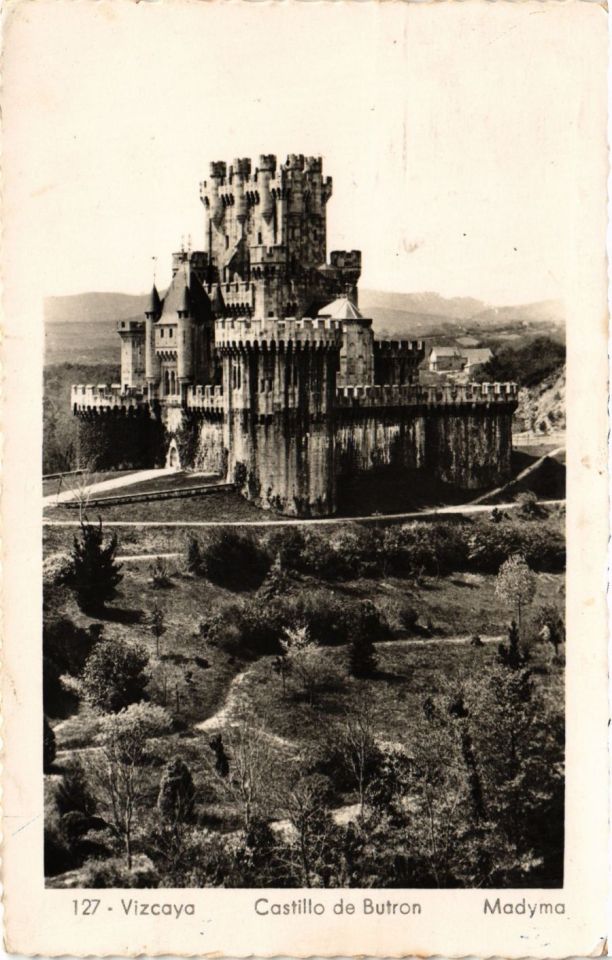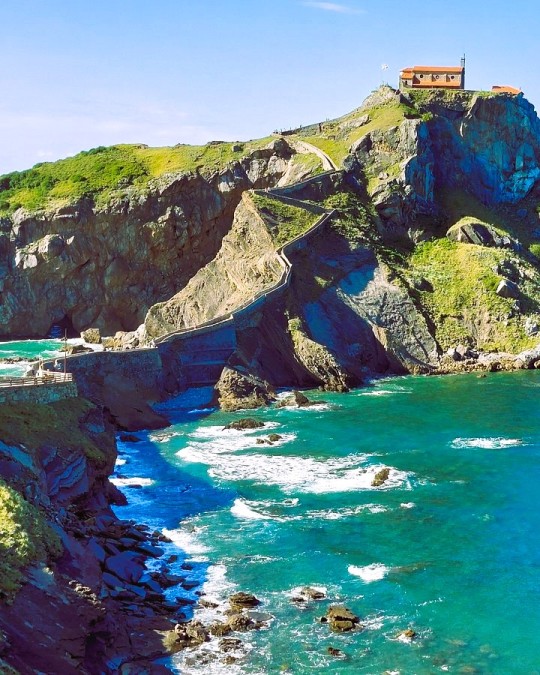#biscay
Explore tagged Tumblr posts
Text


(by hxcmeerkat)| Spain
#upl0ad5#landscape#hxcmeerkat#photoset#photography#aesthetic#woods#forest#foggy#Basque Country#Bizkaia#Biscay#Spain
508 notes
·
View notes
Text

ART NOUVEAU puerta en San Sebastian-Donostia en ESPAÑA
121 notes
·
View notes
Photo

Biscay Jacksons Purple (#1f3e74 to #282b9e)
16 notes
·
View notes
Text





Euskalerria 05/2024 (2) (3) (4) (5) by Victor
#country road#small town#trees#countryside#houses#weather vane#metalwork#cats#dogs#goats#birds#basque country#biscay
12 notes
·
View notes
Text

Bilbao, Biscay Province, Basque Country, Spain
Mitchell Orr
26 notes
·
View notes
Text

Butrón Castle in Gatica, Biscay, Basque Country region of Spain
Spanish vintage postcard
#vintage#tarjeta#briefkaart#butrn#butrón castle#basque country#postcard#photography#region#postal#gatica#spanish#carte postale#biscay#sepia#basque#ephemera#country#historic#ansichtskarte#spain#postkarte#castle#postkaart#photo
17 notes
·
View notes
Text

Berango
“An aerial view of Berango in the Basque Country.” - via Wikimedia Commons
#berango#basque country#spain#españa#biscay#sopela#wikipedia#wikipedia pictures#wikimedia commons#aerial photography#aerial view#places#europe#iberian peninsula#mediterranean
5 notes
·
View notes
Text
















National Save a Spider Day
National Save a Spider Day is celebrated on March 14 annually in the U.S. in part to reduce arachnophobia, a fear of spiders, and to conserve spiders. People are usually afraid of spiders, mostly due to their bites which are considered deadly. Although most of the fear is largely unfounded and exaggerated, spiders are incredibly useful to humans as they work as effective pest control among other things. On this day, we look at the many reasons why we should rather trap a spider in a jar and take it outside than kill it. Let us spin webs about spiders and why they should be saved.
History of National Save a Spider Day
The history of Save A Spider Day, as well as the organization or individual who created it, is still being researched. Natural-resource organizations or biologists may have instituted this National Save A Spider Day in response to the growing recognition of spiders’ significance in both the environment and the daily lives of humans.
In the opinion of specialists, spiders perform a very vital function in maintaining the balance of nature’s ecosystem. Spiders, together with other species such as birds and ants, have a substantial impact on the reduction of insect populations. The world’s natural ecology would be severely out of balance if they didn’t exist. Cobweb spiders and cellar spiders are the two most prevalent types of spiders that have been discovered to invade our homes, according to scientific research. They are quite common inhabitants of the indoor ecosystem, and they can improve the living conditions of our living areas.
This is because spiders prefer to hide in dark places while waiting for their victim. The pests they trap and devour include annoying pests such as cockroaches and pincer ants, as well as disease-transmitting insects such as mosquitoes and flies. Sometimes the spiders work together to kill the toxic spiders, although this is not always the case. Among other things, our good friend the basement spider is well-known for killing dangerous black widow spiders.
National Save a Spider Day timeline
300 Million Years Ago The First Spider is Spotted
The first spider is reported as a species.
30 Million Years Ago The Modern Spider Emerges
Spiders — as we know them today — appear at this time as they evolve from their ancestors.
1998 The Museum Works With Them
Dan Babbit from The Smithsonian Museum works with spiders and comes to appreciate their uniqueness.
2016 The Desertas Wolf Spiders
Mark Bushell and his team of spiders go on to successfully reproduce and bring back 25 spiders from Madeira.
National Save a Spider Day FAQs
Are spiders friendly?
No, they are not. Spiders often are isolated and do not intentionally seek the company of humans if they enter their homes.
Can a spider be tamed?
Spiders can be tamed including tarantulas which is why you can see them as pets.
Do Spiders live on every continent?
Except for Antarctica, spiders can be found on every other continent.
How to Observe National Save a Spider Day
Save a spider
Learn about spiders
Watch Spider-Man
When you see a spider, you can save one instead of killing them. You can put the spider in a jar and then release it back into the wild.
On this day, you can learn about the behavior of spiders and learn about their habits. You can also study the difference between poisonous and non-poisonous species of spiders.
You can watch your favorite superhero bitten by a radioactive spider, Spider-Man. Watching Spider-Man can add to the interest of others so that they are not as afraid.
5 Interesting Facts About Spiders
Arachnophobia is common
Only a few are dangerous
A symbol of good luck
They produce silk
Spiders have gone to Space
This is the fear of spiders and is the third most common phobia in the U.S.
Most spiders do not have venom dangerous enough to the average-sized human.
Many cultures such as Greek, Roman, Scottish, and American Indian cultures consider spiders to be a symbol of good luck.
Spiders produce silk that researchers use to test its strength and elasticity to see how it can be employed in several ways.
Researchers have sent spiders to space to study the effects of zero gravity on their skill to spin their webs.
Why National Save a Spider Day is Important
Spiders are Important Predators
Spiders produce silk
Spiders are sensitive
Spiders eat insects wherever they are situated —inside or outside the house— which reduces the number of insects around. They keep the number of pests under control reducing the diseases that are being spread and fewer insects bothering humans.
All spiders produce silk which is one of the strongest materials that have been discovered. The tensile strength of high-grade alloy steel.
Spiders have poor eyesight but they have sensitive legs. These legs have tiny hairs which help them detect scents, help them find food, find potential mates, and sense vibrations.
Source
#National Save a Spider Day#NationalSaveASpiderDay#14 March#travel#Guggenheim Museum Bilbao#Bilbao#Basque Country#Biscay#Spain#summer 2021#España#Ottawa#Ontario#Canada#2018#vacation#National Gallery of Canada#Maman by Louise Bourgeois#architecture#cityscape#Notre Dame Cathedral Basilica of Ottawa#sculpture#public art#original photography#tourist attraction
1 note
·
View note
Link
Avila, Containers loss, Bay of Biscay Container ship AVILA lost 2 containers overboard in Bay of Biscay some 12 nm off Cape Busto, Spain, in the afternoon Mar 31. The ship was en route from Bilbao to Vigo, but after containers loss in adverse weather conditions, she was diverted to Gijon, probably to secure shifted containers stacks. Lost containers weren’t found, presumably they sank. Containers are loaded with tires and plastic package materials. The opinions expressed herein are the author’s and not necessarily those of News2Sea. #Containers #loss #Bay #Biscay
0 notes
Text
i actually sometimes can't rest easy knowing ireland is all the way over there and so close to england it should be down here with the rest of the piigs
#i’m thinking ionic sea#but biscay area would be great and not too crazy in terms of suncream and vitamin d
115 notes
·
View notes
Text

Gaztelugatxe Islet, Basque Country, Spain: Gaztelugatxe is an islet on the coast of Biscay belonging to the municipality of Bermeo, Basque Country. It is connected to the mainland by a man-made bridge. Wikipedia
120 notes
·
View notes
Text

Hermosa puerta de la Catedral de BILBAO
#hermoso#puerta#catedral#beautiful#door#cathedral#bilbao#biscay#biscaya#basque country#pais vasco#españa#spain#europe#europa
67 notes
·
View notes
Photo

Inch Worm Biscay (#9fef14 to #173359)
14 notes
·
View notes
Text





Euskalerria 05/2024 (2) (3) (4) (5) by Victor
7 notes
·
View notes
Text

The furious action between H.M.S. Mars and the French '74 Hercule off Brest on 21st April 1798
by John Christian Schetky
#john christian schetky#art#battle of the raz de sein#duel#age of sail#marine art#royal navy#england#great britain#france#history#europe#french revolutionary wars#hercule#hms mars#naval battle#naval warfare#alexander hood#louis lhéritier#english#british#french#bay of biscay#warship#warships#ships#clouds#moonlight#moonlit#sea
50 notes
·
View notes
